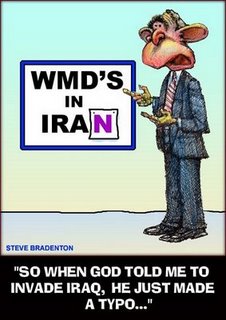
Seymour Hersch has an interesting (and downright scary) article in this week's New Yorker. He states that, not only is the Bush administration preparing for war in Iran (to prevent them from getting nukes, even though they are at least ten years away from producing a nuclear weapon)
The Bush Administration, while publicly advocating diplomacy in order to stop Iran from pursuing a nuclear weapon, has increased clandestine activities inside Iran and intensified planning for a possible major air attack. Current and former American military and intelligence officials said that Air Force planning groups are drawing up lists of targets, and teams of American combat troops have been ordered into Iran, under cover, to collect targeting data and to establish contact with anti-government ethnic-minority groups. The officials say that President Bush is determined to deny the Iranian regime the opportunity to begin a pilot program, planned for this spring, to enrich uranium.
...Some operations, apparently aimed in part at intimidating Iran, are already under way. American Naval tactical aircraft, operating from carriers in the Arabian Sea, have been flying simulated nuclear-weapons delivery missions—rapid ascending maneuvers known as “over the shoulder” bombing—since last summer, the former official said, within range of Iranian coastal radars.
but that they have no compunction about using nukes in this endeavor
One of the military’s initial option plans, as presented to the White House by the Pentagon this winter, calls for the use of a bunker-buster tactical nuclear weapon, such as the B61-11, against underground nuclear sites...The elimination of Natanz would be a major setback for Iran’s nuclear ambitions, but the conventional weapons in the American arsenal could not insure the destruction of facilities under seventy-five feet of earth and rock, especially if they are reinforced with concrete.
...The lack of reliable intelligence leaves military planners, given the goal of totally destroying the sites, little choice but to consider the use of tactical nuclear weapons. “Every other option, in the view of the nuclear weaponeers, would leave a gap,” the former senior intelligence official said. “ ‘Decisive’ is the key word of the Air Force’s planning. It’s a tough decision. But we made it in Japan.”
 He went on, “Nuclear planners go through extensive training and learn the technical details of damage and fallout—we’re talking about mushroom clouds, radiation, mass casualties, and contamination over years. This is not an underground nuclear test, where all you see is the earth raised a little bit. These politicians don’t have a clue, and whenever anybody tries to get it out”—remove the nuclear option—“they’re shouted down.”
He went on, “Nuclear planners go through extensive training and learn the technical details of damage and fallout—we’re talking about mushroom clouds, radiation, mass casualties, and contamination over years. This is not an underground nuclear test, where all you see is the earth raised a little bit. These politicians don’t have a clue, and whenever anybody tries to get it out”—remove the nuclear option—“they’re shouted down.”
Once again, Bush's know-nothing non-experts are making the decisions, while those who actually know something about the subject are being marginalized. And we know how well that worked out last time.
The attention given to the nuclear option has created serious misgivings inside the offices of the Joint Chiefs of Staff, he added, and some officers have talked about resigning. Late this winter, the Joint Chiefs of Staff sought to remove the nuclear option from the evolving war plans for Iran—without success, the former intelligence official said. “The White House said, ‘Why are you challenging this? The option came from you.’ ”
The Pentagon adviser on the war on terror confirmed that some in the Administration were looking seriously at this option, which he linked to a resurgence of interest in tactical nuclear weapons among Pentagon civilians and in policy circles. He called it “a juggernaut that has to be stopped.” He also confirmed that some senior officers and officials were considering resigning over the issue. “There are very strong sentiments within the military against brandishing nuclear weapons against other countries,” the adviser told me. “This goes to high levels.” The matter may soon reach a decisive point, he said, because the Joint Chiefs had agreed to give President Bush a formal recommendation stating that they are strongly opposed to considering the nuclear option for Iran. “The internal debate on this has hardened in recent weeks,” the adviser said. “And, if senior Pentagon officers express their opposition to the use of offensive nuclear weapons, then it will never happen.”
The adviser added, however, that the idea of using tactical nuclear weapons in such situations has gained support from the Defense Science Board, an advisory panel whose members are selected by Secretary of Defense Donald Rumsfeld. “They’re telling the Pentagon that we can build the B61 with more blast and less radiation,” he said.
The chairman of the Defense Science Board is William Schneider, Jr., an Under-Secretary of State in the Reagan Administration. In January, 2001, as President Bush prepared to take office, Schneider served on an ad-hoc panel on nuclear forces sponsored by the National Institute for Public Policy, a conservative think tank. The panel’s report recommended treating tactical nuclear weapons as an essential part of the U.S. arsenal and noted their suitability “for those occasions when the certain and prompt destruction of high priority targets is essential and beyond the promise of conventional weapons.” Several signers of the report are now prominent members of the Bush Administration, including Stephen Hadley, the national-security adviser; Stephen Cambone, the Under-Secretary of Defense for Intelligence; and Robert Joseph, the Under-Secretary of State for Arms Control and International Security.
Read the whole article
here.Unless, of course, you want to still be able to sleep nights.
 Seymour Hersch has an interesting (and downright scary) article in this week's New Yorker. He states that, not only is the Bush administration preparing for war in Iran (to prevent them from getting nukes, even though they are at least ten years away from producing a nuclear weapon)
Seymour Hersch has an interesting (and downright scary) article in this week's New Yorker. He states that, not only is the Bush administration preparing for war in Iran (to prevent them from getting nukes, even though they are at least ten years away from producing a nuclear weapon) He went on, “Nuclear planners go through extensive training and learn the technical details of damage and fallout—we’re talking about mushroom clouds, radiation, mass casualties, and contamination over years. This is not an underground nuclear test, where all you see is the earth raised a little bit. These politicians don’t have a clue, and whenever anybody tries to get it out”—remove the nuclear option—“they’re shouted down.”


0 Comments:
Post a Comment
<< Home